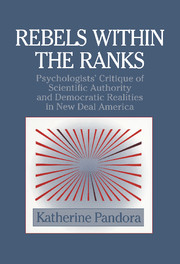 Rebels within the Ranks
Rebels within the Ranks Published online by Cambridge University Press: 06 October 2009
The recognition of cultural relativity carries with it its own values, which need not be those of the absolutist philosophies. It challenges customary opinions and causes those who have been bred to them acute discomfort. It rouses pessimism because it throws old formulas into confusion, not because it contains anything intrinsically difficult.
Ruth Benedict (1934)Debates over the place of science in the American democracy turned in large part on the meanings invested in the terms “science” and “democracy” by the participants. As I have discussed in the preceding chapters, Allport's and the Murphys' definitions of science contained assumptions that placed their views at odds with those of their colleagues. So, too, with their understandings of democracy: if Allport and the Murphys agreed with many of their contemporaries as to what the social, political, and economic facts of democratic life were, their interpretation of what these facts signified could diverge sharply. This was especially true in regard to whether or not the general public could be trusted with the responsibilities required of a democratic citizenry. From within the radically progressive political framework of these scientists' views, the idea of “social control” meant the regulation of economic elites by the public; for many of their peers, the idea of “social control” meant the regulation of an irrational public by administrative elites.
At issue was the question of how far the nation had progressed in its quest to become a truly democratic polity. Activists such as Allport and the Murphys belonged among those who believed that American democracy was to be defined as an aspiration yet to be reached as opposed to a goal that had already been achieved.
To save this book to your Kindle, first ensure no-reply@cambridge.org is added to your Approved Personal Document E-mail List under your Personal Document Settings on the Manage Your Content and Devices page of your Amazon account. Then enter the ‘name’ part of your Kindle email address below. Find out more about saving to your Kindle.
Note you can select to save to either the @free.kindle.com or @kindle.com variations. ‘@free.kindle.com’ emails are free but can only be saved to your device when it is connected to wi-fi. ‘@kindle.com’ emails can be delivered even when you are not connected to wi-fi, but note that service fees apply.
Find out more about the Kindle Personal Document Service.
To save content items to your account, please confirm that you agree to abide by our usage policies. If this is the first time you use this feature, you will be asked to authorise Cambridge Core to connect with your account. Find out more about saving content to Dropbox.
To save content items to your account, please confirm that you agree to abide by our usage policies. If this is the first time you use this feature, you will be asked to authorise Cambridge Core to connect with your account. Find out more about saving content to Google Drive.